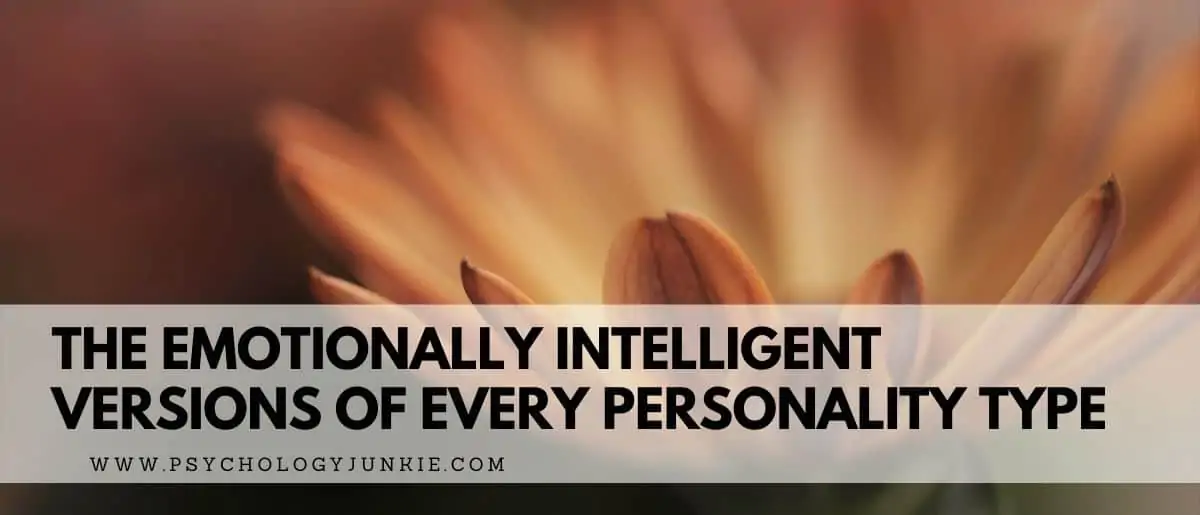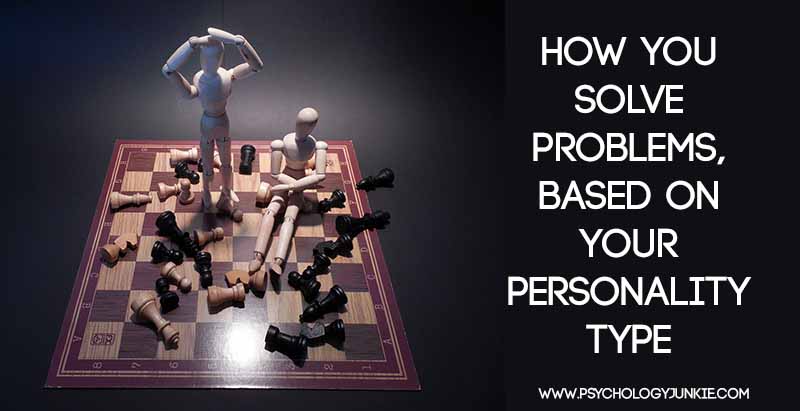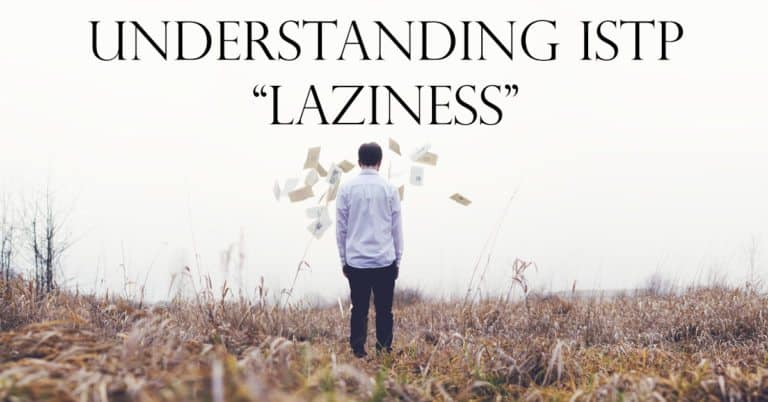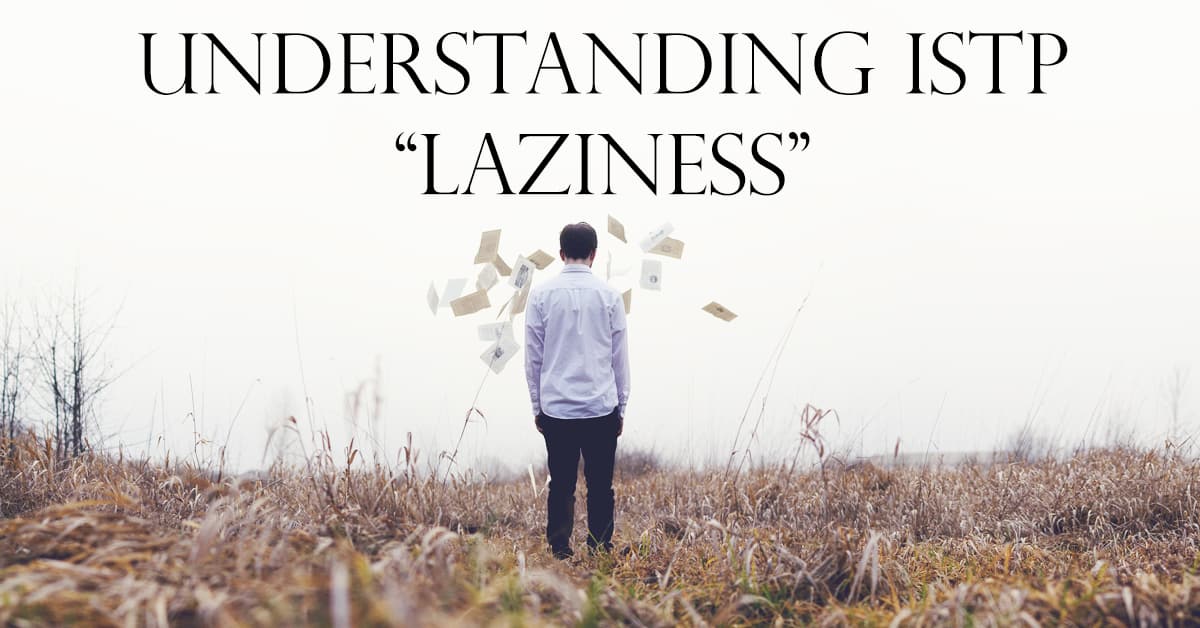The Emotionally Intelligent Versions of Every Personality Type
Some people equate emotional intelligence with personality type. But is this really the right thing to do? Are certain types more emotionally intelligent than others?
First off, what is emotional intelligence?
PsychologyToday.com describes emotional intelligence as “the ability to identify and manage one’s own emotions, as well as the emotions of others.” The web site goes on to state that “Emotional intelligence is generally said to include a few skills: namely emotional awareness, or the ability to identify and name one’s own emotions; the ability to harness those emotions and apply them to tasks like thinking and problem solving; and the ability to manage emotions, which includes both regulating one’s own emotions when necessary and helping others do the same.”

People with high EQ (Emotional Quotient) aren’t impulsive, hasty, or over-reactive. They’re able to regulate their emotions, name them, and process them rationally. They don’t downplay the importance of emotions, nor do they let their emotions control them. They are self-aware and reflective.
Table of contents
- First off, what is emotional intelligence?
- Are Certain Personality Types More Emotionally Intelligent Than Others?
- The Emotionally Intelligent Versions of Every Myers-Briggs® Personality Type
- The ENFP
- The ENTP
- The INFP
- The INTP
- The ENFJ
- The ENTJ
- The INFJ
- The INTJ
- The ESFP
- The ESTP
- The ISFP
- The ISTP
- The ESFJ
- The ESTJ
- The ISFJ
- The ISTJ
- What Are Your Thoughts?
Estimated reading time: 19 minutes
Are Certain Personality Types More Emotionally Intelligent Than Others?
The short answer is no. Any type can be emotionally intelligent or unintelligent. Healthy Feeling Judgers are naturally skilled at identifying other people’s emotions; yet they can sometimes struggle to understand their own. Healthy Thinking types are good at problem solving but they can also minimize the importance of their own (or others) emotions. Each type has its own potential weaknesses and strengths when it comes to emotional intelligence. We’re going to look at this more in today’s article.
The Emotionally Intelligent Versions of Every Myers-Briggs® Personality Type
The ENFP
The emotionally intelligent ENFP is able to see emotions from many different angles and perspectives. They are gifted at detecting nonverbal emotional signals such as body language and facial expressions. It’s also easy for them to see how people all experience many varied emotional reactions to the same stimuli – they don’t expect everyone to have the same emotional reaction as they do. These healthy ENFPs take time for self-reflection, introspection, and self-care. When they spend regular time alone they can delve into Introverted Feeling, their auxiliary function. During these times they assess whether they’re living according to their values, and they dig into their emotions to see if there may be any underlying lessons, values, or issues that they those emotions are trying to bring to the surface.
ENFP Emotional Superpowers (for healthy ENFPs):
– Can explore emotions from many different angles
– Can empathize with a wide variety of emotions
– Can generate multiple avenues for dealing with/processing emotions
– Can use emotions to creatively pursue various artistic pathways
– Are skilled at creating a collaborative, accepting environment
– Can often motivate other effectively by harnessing emotions and using them as fuel for progress
Read this next: Dealing with Emotional Overwhelm as an ENFP
The ENTP
ENTPs are able to easily read other people’s emotional signals like body language, expressions, and subtle cues. While it can be easy for average to unhealthy ENTPs to use this emotional awareness to manipulate or charm people, the healthy ENTP uses this ability to connect with and help others. These ENTPs pay attention to their emotions, using them to stir cognitive activity and thinking. Is the emotion accurate? Is it driven by a deeper, more ego-driven impulse? They are good at pausing and interpreting an emotion before giving into it. Often times they have to externalize the emotion in order to understand it thoroughly. This can be done through writing the emotions down or expressing them to a confidante. Through externalizing their feelings, they can piece together which emotions are important and valid and which are irrational or ego-driven. Healthy ENTPs can be deeply empathetic and astute when it comes to “reading” the emotional experiences of others.
ENTP Emotional Superpowers (for healthy ENTPs):
– Can often read the emotions of others and accurately identify them
– Can motivate and encourage others by harnessing their emotions effectively
– Are good at verbally sorting out emotions to determine which are accurate and which are irrational
– Can be diplomatic when needed (if healthy)
– Are skilled at self-regulating and thinking through emotions before acting on them
– Can generate possibilities for dealing with emotions
– Don’t quickly blame others when something goes wrong
The INFP
The emotionally intelligent INFP is thoughtful and considerate, taking time to thoroughly process emotional data. This INFP tends to respond to life slowly, but in a good way. They probe the depths of their souls to understand what their emotions mean in the grand scheme of things. They realize that emotions are deeply personal and nuanced, thus they are slow to make rapid judgments about people and what they need emotionally. Their open-mindedness and imagination enable them to easily get in other people’s shoes and mirror their emotions. They have a gift for helping people put words to their feelings. Creating an atmosphere of emotional safety is also something they’re good at. Creating a warm, accepting environment for others to express themselves without fear of shame is something they prioritize. When an interpersonal problem arises, these INFPs can have uncomfortable conversations in a tactful and empathetic way. Building psychological safety in teams or one-on-one settings is something they excel at.
INFP-Specific Emotional Superpowers (for healthy INFPs):
– Mirror and identify other people’s emotions
– are self-aware of their own emotions and accurately identify them
– Communicate tactfully and diplomatically
– Use imagination to solve emotional issues
– Create a safe space for emotional expression
– Reflect on emotions before acting on them
– Know their own values, and thus which emotions are worth prioritizing or downgrading.
– Don’t quickly blame others when something goes wrong
– Easily put themselves in other people’s shoes
Read this next: Dealing with Emotional Overwhelm as an INFP
The INTP
Emotionally intelligent INTPs have a lot of self-control when it comes to their feelings. They’re not the types to fly off the handle or make sweeping, generalized statements because they’re having a bad day. Instead, they analyze their own and others’ emotions in order to find the underlying causes and separate what’s rational from what is irrational. This ability allows them to enter emotionally chaotic situations with a level head, seeing the emotions of the room as data to be interpreted rather than stormy feelings that can toss and turn them whichever way they choose. They can be a quiet, rational presence for people who are struggling emotionally; validating their feelings while offering alternatives and other perspectives that might alter the situation. These INTPs take time to put themselves in others’ positions before making rapid judgments about them.
INTP Emotional Superpowers (for healthy INTPs):
– Exert willpower and self-control over emotions rather than impulsively giving into them
– Think independently rather than being swayed by the emotions of others
– Try to put themselves in others’ positions before making judgments
– Generate alternatives and possibilities to solve conflicts
– Identify the underlying facets involved in an emotional experience
– Tend to stay calm in challenging situations
Read this next: 10 Things That Terrify INTPs
The ENFJ
Emotionally intelligent ENFJs have a powerful ability to recognize and empathize with a wide variety of emotional experiences. Reading the emotional atmosphere is something that comes naturally to them, and they can easily orchestrate warm, inviting environments so that people feel safe expressing themselves. These ENFJs enjoy being counselors, mentors, and listening ears and are often sought out when someone is going through a hard time. Inspiring others and encouraging them is something that comes naturally. Diplomacy and tact also come naturally to this ENFJ, and they often think about what they say and how it will impact people before they say it. When it comes to their own emotions, healthy ENFJs usually need an external way to process before they can accurately identify what they’re feeling and trust it. Because of this they often enjoy journaling or having a trusted confidante to talk to in order to sort out which of their own feelings are accurate, and which might be irrational. These ENFJs usually have strong social skills because they are so tapped into the emotional temperature of whatever environment they are in and know what things will motivate or demotivate people.
ENFJ Emotional Superpowers (for healthy ENFJs):
- Create warm, accepting environments so others can express emotions freely
- Easily identify and empathize with a wide variety of emotions
- Recognize and define their own emotions after externally processing them
- Communicate tactfully and diplomatically
- Use imagination and insight to solve emotional issues
- Can easily discard emotions that get in the way of the overall goals of the group, when healthy to do so
- Know what matters in the big picture, so can easily put out small squabbles with others
The ENTJ
Emotionally intelligent ENTJs seek out strategies and frameworks for understanding people and interacting with them effectively. They use communication as a tool and know that empathy is a vital part of effective communication. Getting a gist of someone’s ideas, expertise, or overall values is something that these ENTJs excel at. Most average ENTJs tend to move through life without a lot of concern for their own emotions (or the emotions of others). But emotionally intelligent ENTJs know that if they dismiss their own (or others) emotions, it will backfire in the long run. They take the time to identify their own emotions, slowing down their work and interactions to make sure there isn’t an emotion trying to get their attention and alert them to something important. They know that the best way to understand other people is to actively listen and pay attention to body language, tone of voice, and comfort levels. They can be highly motivational in conflicts or emotional struggles, helping people to see the big picture or unique insights into various challenges.
ENTJ Emotional Superpowers (for healthy ENTJs):
- Are usually skilled in effective communication
- Manage their own emotions when a challenge is present, unless severely stressed
- Know how to self-regulate so that they don’t make emotionally reactive or impulsive decisions
- Know their own values so that they don’t get riled up about things that don’t matter
- Are self-motivated and can harness their emotions to help them (or others) do a good job on a project
- Put themselves in other people’s positions before judging them
The INFJ
Emotionally intelligent INFJs want to relate to people in meaningful ways. Empathy comes easily to these types, and they naturally put themselves in other people’s shoes. It’s usually natural for them to sense what other people are feeling and accurately identify those feelings. At the same time, it can be a struggle for them to accurately name their own emotions unless they have a way to externalize those feelings through writing them down or expressing them out loud. Emotionally intelligent INFJs take time to jot down their feelings or express them so that they can be self-aware and effective. They often pause to assess how their moods are affecting them and their decisions. Rash, impulsive decision-making isn’t usually something they struggle with unless they are dealing with severe or chronic stress. Instead, they usually listen to their feelings and self-regulate, focusing on what’s accurate as well as what aligns with their values. Tactfully and diplomatically dealing with others, particularly in conflict, is something that INFJs excel at. They can easily see two sides to any story and are able to help people in conflict see where their values align or how they are just seeing the same thing from two different perspectives.
INFJ Emotional Superpowers (for healthy INFJs):
- Easily empathize with a wide variety of people
- Can recognize and name the emotions of others
- Know how to relate to people in meaningful ways
- Communicate tactfully and diplomatically
- Are self-aware and authentic
- Can harness emotions in order to motivate or counsel others
- Know how to look beneath the surface to understand what’s really going on with someone
Read this next: How to Honor Your Inner Child as an INFJ
The INTJ
Emotionally intelligent INTJs know what’s important to them and don’t allow minor distractions and irritants to emotionally overwhelm them. They can usually identify their feelings and strategize ways to honor those feelings while still staying aligned with their goals. When it comes to relating to others, these INTJs have usually developed frameworks for understanding people and relating to them effectively. It’s easy for them to sense when people are being authentic or manipulative and they aren’t easily controlled by others’ emotions or manipulated emotionally. When it comes to giving and accepting critique, INTJs can usually do so with a level head and without reacting emotionally. They find ways to tailor critiques so that they can be the most effective, and this means being tactful and considerate rather than brash or harsh. When emotionally upset, these INTJs pause and control their thoughts before reacting – trying to sort out if their emotions are valid or simply an ego-defensive mechanism.
INTJ Emotional Superpowers (for healthy INTJs):
- Pause and analyze emotions before acting on them
- Communicate effectively, using insight to understand how people will be impacted
- Can give and take criticism without getting emotionally reactive or defensive
- Protect themselves from emotional sabotage
- Have a fine-tuned awareness of people’s authenticity levels
- Often keep their commitments and can stay on track, even when they are struggling emotionally
- Like to support people emotionally by providing strategic assistance or insight
The ESFP
Emotionally intelligent ESFPs have a grounded sense of knowing; knowing about people, knowing about life itself, and what’s real and meaningful. They see the beauty in the present and enjoy sharing that with others. They easily can sense what people are feeling and have the skill of being able to “read the room.” Listening to other people share their emotional highs and lows is something they do well, although it may take a little more nudging to get them to share their own feelings. These types only share their deepest emotions with those who they know they can trust through hard times and good. ESFPs who are emotionally intelligent think about their feelings, and take time to get alone and process them in private. They pause before jumping into action or retorts, assessing what’s really true or authentic or meaningful to them. They’re also not easily swayed by “emotional hijacks” or people who would manipulate them. Their feeling side makes them keenly attuned to inauthentic remarks or ulterior motives. Relationships that matter to them are ones where they can be honest, real, and without pretense.
ESFP Emotional Superpowers (for healthy ESFPs):
- Self-aware and authentic
- Grounded and down-to-earth, taking in facts as well as feelings
- Easily empathize with others
- Can recognize and name their own, as well as others’, emotions
- Pause before jumping to conclusions
- Know how to communicate tactfully
- Are aware of emotional manipulators and can protect themselves from them
- Like to provide practical assistance to those who are struggling
The ESTP
ESTPs who are skilled in emotional intelligence know how to read other people’s feelings and moods and respond in an appropriate way. They are often more caring and insightful than typical type descriptions would imply. They’re also practical and know listening is only part of the equation in helping people. ESTPs are people of action, thus they enjoy helping people in tangible, hands-on ways. In fact, they’re often the first to help out in a crisis or volunteer a helping hand to someone who’s lost or hurt. Although ESTPs are thinkers first, they have a softer inner core. These types enjoy caring, warm relationships and interactions as long as there’s not a lot of emotional hypersensitivity involved. They often benefit from writing out their feelings or discussing them in a safe environment. Inward emotional analysis can be a bit overwhelming for them, but they do the hard work to make sure they’re being authentic and self-aware.
ESTP Emotional Superpowers (for healthy ESTPs):
- Easily sense other people’s moods and feelings (particularly in mid life and beyond)
- Know how to offer practical assistance to those who are struggling
- Show empathy to others
- Know how to deliver feedback and criticism tactfully and effectively
- Forgive and forget rather than harboring resentment
- Use stories to touch others and motivate them to act
- Safeguard themselves from emotional manipulation
The ISFP
Emotionally intelligent ISFPs are deeply self-aware and recognize the power of their own emotions. They know that while others might disparage the value of emotions, they are what drive us to make decisions about careers, love, art, and so much more. Because ISFPs respect emotions, they take the time to listen to them and parse them out without simply acting on them full-speed ahead. Quiet reflection and introspection help them to evaluate what’s important to them and to see what lessons can be learned from all their emotional experiences, both good and bad. ISFPs with high EQ have no problem apologizing when they are wrong, forgiving when a relationship has potential, and keeping their commitments. They realize that everyone’s journey is different and are open-minded to individuals from many varied walks of life.
ISFP Emotional Superpowers (for healthy ISFPs):
- Pause and reflect before acting on their emotions
- Take the time to introspect and consider the value of their emotions
- Empathize readily with others
- Practice honesty and authenticity
- Look for the good in others
- Enjoy the moment
- Safeguard themselves from emotional manipulators
- Embrace diversity
Read this next: 10 Things That Excite the ISFP
The ISTP
Emotionally intelligent ISTPs are quiet and thoughtful, observing people and situations carefully. They realize there’s more than one way of seeing something and pause before making judgments about people’s values or ethics. They learn from their mistakes, avoid half-truths, and present information clearly without manipulation or guile. They say what they mean, mean what they say, and stick to their principles. Instead of labeling others or gossiping about them, ISTPs work hard to see things through another person’s point of view. They’re also aware when people are using manipulation and are quick to avoid manipulators and emotional “hijacks.”
ISTP Emotional Superpowers (for healthy ISTPs):
- Practice honesty and clarity
- Refrain from premature judgments about people
- Enjoy the moment
- Control how they react to their feelings
- Learn from their mistakes
- Are willing to learn from others
- Offer practical assistance and advice to people struggling
- Set healthy boundaries between their own and others’ emotions
- Empathize with the struggles of others
Read this next: 12 Amazing Fictional ISTPs
The ESFJ
Emotionally intelligent ESFJs are highly self-aware and can name and identify their emotions with powerful language. They have a wide emotional vocabulary and are skilled at recognizing their moods as well as the emotions of others. At the same time, they know when to pause and reflect on their feelings and when something should be addressed right away. Unhealthy ESFJs may blurt out their feelings or react to them prematurely, but ESFJs with high EQ know when it’s time to slow down and ponder the weight and accuracy of what they’re feeling first. They do their best to control their emotional responses (like negative self-talk or over-reactions) and think about the best way forward first. They are also deeply empathetic and know how to imagine things from another person’s perspective and respond accordingly. These types are often nurturing and comforting people to be around, especially to those who are going through a personal crisis.
ESFJ Emotional Superpowers (for healthy ESFJs):
- Empathize with a wide variety of people
- Communicate tactfully
- Pause and reflect before responding emotionally
- Give constructive and gentle criticism
- Set healthy boundaries between their emotions and the emotions of others
- Support others without anticipating anything in return
- Support others emotionally and in hands-on ways
- Create a warm, inviting atmosphere that allows others to feel safe expressing themselves
The ESTJ
ESTJs with high emotional intelligence know how to pause before making premature judgments about others. They evaluate situations, historical context, and facts before offering their advice or opinion. They also take time to get in touch with their feelings or seek advice when their emotions feel out of control. Unlike unhealthy ESTJ, healthy ESTJs know that emotions have weight and if they’re ignored or repressed for too long they can bubble up in unhealthy reactions. These ESTJs are self-aware, supportive, and responsible. They take accountability for their mistakes and don’t hesitate to apologize when they’re wrong. They are open to constructive criticism, and know how to frame criticism to others without being harsh or condescending. Helping and supporting others in practical ways is how they show their empathy and concern. They’re also good at stepping outside a situation and seeing the facts without getting emotionally reactive or hypersensitive.
ESTJ Emotional Superpowers (for healthy ESTJs):
- Step outside of situations to see them objectively before reacting
- Deal with conflict without getting emotionally reactive
- Avoid emotional hijacks or manipulators
- Know how to imagine things from another person’s perspective
- Support others in practical ways
- Set healthy boundaries between their own and others’ emotions
The ISFJ
Gentle and nurturing, these ISFJs know how to pause and reflect on their feelings regularly. They’re not reactive or selfish, but focused on helping others in the ways that are best for them. They have a knack for listening and supporting others without redirecting the conversation back to themselves. They also don’t go so far in supporting others that they lose track of their own needs. Having healthy boundaries in place helps them to avoid codependency or self-neglect. ISFJs with high EQ are empathetic, self-aware, and sincere. They seem to inherently know what will put others’ at ease; whether it’s a warm blanket, a cup of coffee, or just a calm, quiet presence. Because these types are introverted, it’s important that they get regular time alone to process their feelings, rest, and refresh themselves. If they spend too much time around others they can wind up overexerting themselves and getting exhausted.
ISFJ Emotional Superpowers (for healthy ISFJs):
- Empathize with a wide variety of people
- Pause and reflect before making judgments
- Think about their feelings in order to be self-aware
- Support others emotionally and practically
- Look at the history and facts of a situation before making judgments
- Learn from their mistakes
- Create a warm, calming atmosphere so others feel safe with them
- Won’t quickly blame others when things go wrong
- Take responsibility for their own emotions
Read this next: 24 Signs That You’re an ISFJ
The ISTJ
ISTJs with high emotional intelligence know that there is more than one way of seeing a situation. They have a calm, thoughtful demeanor and observe situations before jumping in and making judgments. People come to them for practical support or guidance in situations. They know that this ISTJ will carefully assess the facts and history of a situation before giving advice. While these types may not exude gregariousness or warmth all the time, their steadiness and careful nature inspire confidence in others. While they may not talk about their feelings a lot, they take time to think them through and ponder their meaning. They also know how to follow through on their commitments and take responsibility for their mistakes. Humility makes it possible for them to learn from others, apologize when they’re wrong, and give constructive criticism without being condescending or harsh about it.
ISTJ Emotional Superpowers (for healthy ISTJs):
- Step out of a situation to see it objectively before reacting
- Pause and think about their emotions rather than over-reacting
- Take responsibility for their mistakes
- Learn from their experiences
- Offer practical support to people who are struggling
- Take responsibility for their own emotions
- Are authentic and sincere
- Avoid emotional manipulators
- Set healthy boundaries between their own and others’ emotions
What Are Your Thoughts?
Did you enjoy this article? Do you have any thoughts or stories to share? Let us know in the comments!
Find out more about your personality type in our eBooks, Discovering You: Unlocking the Power of Personality Type, The INFJ – Understanding the Mystic, The INTJ – Understanding the Strategist, and The INFP – Understanding the Dreamer. You can also connect with me via Facebook, Instagram, or Twitter!















This is a great article. But did I miss the one that talks about every type’s emotional blind spots?
I wondered whether the caption should read “The Emotionally Unhealthy Versions of Every Personality Type.
My favorite article by you thus far. I’m more in the average range of EI at the moment (skill building in this area is tough) for an INTJ but reading about how I could potentially be as I get more skilled is thrilling. Thank you for the new information.
Maybe it’s just the people I’ve met, but I’ve noticed a lot of T people saying “I have my emotions fully under control”, while they have no clue how emotions actually control them. Totally delusional, which was quite ironic. F people tend to be more aware that, to begin with, it’s impossible to have your emotions under control, you can only deal with them when they arrive.
Wouldn’t that make sense for people with F functions lower in the stack to have, in average, a smaller emotional intelligence? I’m INTP, and 8w7. I know I suck at it. Especially compared to intellectual intelligence. My INFP friends are much more perceptive, even if they have their own emotional issues and tend to emotionally judge quickly, or project on others..
I don’t know. My INFP friends are all very intelligent, but they use their intelligence in a very different way, compared to me. They tend to be more random about it. So I tend to think it’s the same with emotional intelligence, the other way around.
For me of course Ti always has the last word. But I also tend to get angry very easily and not see this as a problem. I used to think, you got me angry, you deal with the consequences and that won’t be pretty. I perceived my anger as a punishment for the other. Verbally. INTP 8w7 is a verbally deadly combo. I’d get the other person as angry as I was, and that’s very easy. I realised reading about enneagram that it’s a way to make the masks fall down, and yeah I realised that’s what I was doing. I still make very valid points when angry, I think that’s why it’s painful. When I call someone stupid, I’m not being mean, I’m stating a fact, and it highly annoys me that they’re stupid.
Now I try to control it a bit more, especially with my fiancé.
But most of the time I’m nice, as long as people aren’t misogynistic or insulting logic. I pick my friends carefully. I’m not for everyone.
An absolutely spot on article. Really enjoyed exploring the various personalities and matching the super powers to my friends. Great article
I really like that every type can be emotionally intelligent in its own unique way. I often have felt that I can never be emotionally intelligent because I am a Thinker (and that I should be much more emotionally intelligent than I am because I am female), but this article gives me hope.
It’s very fascinating how different personality types exhibit emotional intelligence. I am either an INFP or an INFJ but I resonate with the attributes these personalities share in common. I am first of all, introverted by nature. In my opinion, the biggest misconception people have about introverts is that they cannot put themselves in others’ shoes since they do not socialise as much as extroverts do.
This is very far from the truth because as a reticent person, I analyse people’s behaviour sporadically. I can intuitively feel whether someone is being genuine or not. Fore me, values are at the core of any relationships because without knowing the person’s values, it would be unconceivable to understand the person’s issues or point of view. I very often bottle my thoughts up for fear of any repercussions.
Many of my peers would get me wrong because for them, shutting down in face of unfairness is a sign of weakness. I should instead voice out to assert myself whenever people treat me unfairly. I however, glad my friends recognise me for my ability to sympathise rather than the audacity I lack in many social situations. EI is not always about standing for yourself.
Fascinating field of psychology. EI has always been a struggle and interest of mine. I would not proudly admit that I have emotional intelligence of a trash bin. As a HSP, I have developed empathy and of course, high sensitivity. However, I struggle with hypersensitivity and my judgemental and sarcastic nature (both due to my underdeveloped Ti), as well as emotional agility (due to my developing Fe).
Passive aggressiveness is also a key trait of an unhealthy ISFJ. I tend to get very manipulative in order to get what I want, and of course I’ll be filled with guilt later on.
I’m highly neurotic and pessimistic, and therefore have to rely on my emotional absorbing skills to alter my emotions to match the mood of my surroundings.
I get emotional rollercoasters and am alternated between trust and distrust, as well as authenticity and conformity. As an extreme introvert, severely socially anxious HSP, making and maintains friendships has always been a far-fetched fantasy. I have to test people and I’d judge them base on how well they do. Of course, only one passed my unreasonably high standards.
I am immaturely deceitful to myself, especially when it comes to the logical/emotional part of me. I’d like to think I’m cautious by nature, a planner and analyst, as well as an empathetic being. However, I’m aware that I can sometimes get caught up in delusional beliefs and cognitive distortions.
I guess there’s still a glimmer of hope as I read up that EI is affected by the brain structure (wiring and chemical/hormonal balance) so it’s improvable for normal-functioning people (which I’m not, but oh well).
Anyway, it was really fun reading the mid article and the comments. Keep writing!
[The website reloaded for a while and I almost died of an anxiety attack, thinking that my whole comment had been deleted. I guess I can work in that too.]
Oh, one last thing, funny how I’m mirroring now that I’ve read two really long and informative comments. They got me into thinking and understanding the Introverted Intuitives (which I can relate to more than my own type).
I used to think that emotional intelligence was just being able to read other people’s emotions, in which case I think Feeling types would be naturally good at it. But since it’s also defined as not being impulsive, I think the P types would be bad at emotional intelligence. So the types best at EI are FJs and the types worst at EI are TPs.
I know some types are described as “able to understand others’ emotions but can’t understand their own.” I don’t get how this can be possible. I think the reverse can be possible—understanding one’s own emotions but not others’—but not understanding others’ while not understanding one’s own. How can anyone not know how their own self is feeling? Doesn’t every child know when they are feeling happy, sad, angry, or fearful, no matter what their personality type is?